ORGANIC Coconut oil
virgin . from the whole kernel
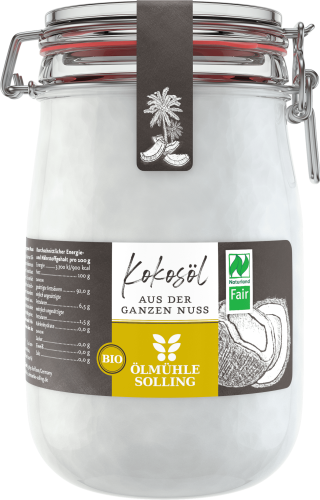

Sri Lanka agriculture

- 100 % virgin organic coconut oil from the whole nut
- from recognized organic NATURLAND cultivation
- highest premium quality from Sri Lanka
- not refined, not hardened, not bleached, not deodorized
- residue-controlled by accredited laboratories in Germany
- VEGAN and lactose-free, lauric acid content 49.5 g per 100 g
from 7368 ratings





Unfortunately, our organic coconut oil was not included in the ÖKO TEST in February 2020. Nevertheless, we do not want to withhold our residue analyses from you, because we are convinced of the "very good" quality of our coconut oil.
Read more
Our Naturland Fair coconut oil impresses with its first-class quality and delicious taste. It is gently extracted from the flesh of the freshly harvested coconut, including its thin, brown seed coat. Coconut milk can also be obtained from the flesh of the coconut. Naturland Fair coconut oil differs from the snow-white, virgin coconut oil from the peeled coconut in that it has a slightly creamy appearance and a stronger taste. Our coconut oil from the whole nut is vegan, is not hardened or deodorized and is very versatile.
Coconut oil also scores highly in terms of nutritional values: although coconut oil contains many saturated fatty acids, the majority of these consist of medium-chain fatty acids, known as MCTs (middle chain triglycerides). One of these medium-chain fatty acids is lauric acid, which makes up almost half (49.5 g per 100 g) of the fatty acids in coconut oil. It is valuable for adults and children and is an important component of breast milk, among other things. In combination with a varied diet, coconut oil makes an important contribution to a healthy diet.
The harvested coconut is classified as a highly nutritious food. It is rich in fiber, vitamins, minerals and phenolic compounds. The edible coconut meat contains around 45% water, 35% coconut fat, 9% fiber, 5% carbohydrates, 5% protein and 1% vitamins and minerals.
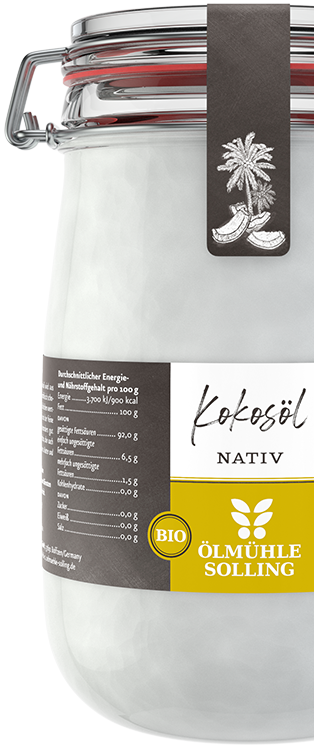
Valuable coconut oil
7 Tips for use


- 1 for frying, baking & deep-frying
Coconut oil is a natural, heat-stable vegetable fat and is ideal for hot cooking thanks to its special fatty acid composition. more - 2 as a spread
Coconut naturally provides a wealth of high-quality nutrients such as protein, fiber, minerals and vitamins. Its creamy texture makes it ideal as a butter substitute. - 3 for beautiful skin
The exotic oil penetrates the skin particularly quickly and stays there longer than water-based creams. It protects the skin from moisture loss and keeps it supple. more - 4 for shiny hair
Virgin coconut oil is a proven and popular hair care product. The exotic oil has a nourishing effect and moisturizes the hair and scalp. more - 5 for oral & dental care
Coconut oil is perfect for oil pulling, an Ayurvedic method for cleaning and caring for the mouth and teeth, due to its antibacterial effect. more - 6 for soft lips
As a natural lip care product, coconut oil leaves the skin feeling soft and nourished for a long time and is completely free from synthetic colorants or fragrances. more - 7 for dogs & cats
Coconut oil is also popular with dogs and cats for coat care and food supplements. Ticks and fleas do not like coconut oil, so it is even said to protect against vermin. more
Coconut oil in the kitchen
The delicate, typical aroma of fresh coconut is incomparable and characteristic of the delicious national cuisines of the regions where coconuts grow. For the inhabitants of the tropics, the delicious nut is a natural part of every meal. Coconut oil, grated coconut, fine coconut flour, seasoning oils and delicious spreads based on coconut oil also bring a variety of flavors and tropical joie de vivre to our kitchens in this country.
Coconut oil is an ideal, purely natural vegetable fat with a wide range of uses in the kitchen. Its natural composition makes it long-lasting and heat-stable, which prevents the formation of trans fatty acids when frying, baking and deep-frying. As it consists mainly of saturated fatty acids and is therefore less sensitive to oxidation, coconut oil can be kept for up to two years after pressing. Coconut oil has many culinary uses. It is suitable for meat and fish dishes, for vegetarian and vegan dishes and, of course, for sweet dishes. Take a look at our recipe collection and let yourself be inspired.
With its nutty flavor, it not only adds a special touch to Asian dishes, but also to domestic dishes. As a spread, coconut oil is delicious on its own and as a butter substitute for cheese, jam and the like.
Coconut oil nutritionally
Ölmühle Solling offers only the best quality, so-called 'virgin coconut oil'. It is mechanically pressed from fully ripe organic coconuts, carefully bottled to preserve its value and, of course, not bleached or refined. This is why it scores with its fine coconut note and inner values.
Coconuts naturally provide a wealth of high-quality nutrients such as protein, carbohydrates, fiber, vitamins and minerals. Ölmühle Solling offers a wide range of top-quality coconut products, including virgin coconut oil, which is known as "Virgin Coconut Oil". The abbreviation "VCO" for "Virgin Coconut Oil" has become a synonym for quality worldwide.
Virgin coconut oil is produced as gently as possible from ripe organic coconuts, mechanically pressed and bottled fresh from the mill. It scores points not only with its fine coconut aroma, but above all with its inner values: it contains medium-chain fatty acids, the so-called MCTs (middle chain triglycerides), such as lauric acid, which makes up almost half of the fatty acids in the oil. In combination with a varied, fresh diet, coconut oil makes an important contribution to a balanced diet.
As coconut oil does not contain any essential polyunsaturated fatty acids, a variety of oils should be used for a balanced diet. Vital oils in particular, such as our freshly milled linseed oil and our omega DHA oils, provide essential omega-3 fatty acids. This is why Ölmühle Solling offers you a large selection of freshly milled organic cooking oils for changing the oil in your kitchen.
Coconut oil for skin care
Coconut oil is not only a true all-rounder in the kitchen: it also serves as a rich skin care product. For this reason, we also use coconut oil as a valuable ingredient in the skin balms and soaps in our Solling natural cosmetics range.
The exotic oil not only provides a pleasant fragrance, but also acts as a natural protective coating for unsaturated fatty acids. It is also very well tolerated. It gives our skin balms a pleasant texture and a special nourishing effect, which also helps dry skin to retain moisture for a long time. It also provides intensive care and moisture when applied pure to the skin. Coconut oil contains natural antioxidants, protects the skin from free radicals and prevents skin ageing.
Make-up removal with coconut oil

Coconut oil is also suitable for gently removing make-up. Simply moisten a make-up removal pad with warm water, add a little coconut oil and gently wipe over skin, lips or eyelashes. Washable make-up removal pads made from bamboo or organic cotton are reusable and resource-friendly.
Coconut oil for baby care
Of course, our pure, natural coconut oil is also ideal for the delicate skin of babies and children. It is 100% free from synthetic additives and is very well tolerated. The coconut oil can be used pure as a cream and can also be added to bath water as a nourishing additive.
Coconut oil for soft lips
Virgin coconut oil is an ideal lip care product. The exotic oil has a pleasant fragrance and acts as a natural protective coating for the sensitive skin of the lips. You can also use coconut oil to make your own scrub for soft, nourished lips:
½ tsp coconut oil
½ teaspoon of coconut blossom sugar or cane sugar
½ tsp honey
Mix the ingredients together well, apply and massage gently over the lips for one to two minutes. Rinse off with lukewarm water and pat dry with a soft towel. This gently removes dead cells and revitalizes and nourishes the skin.
Coconut oil for oil pulling

Oil pulling is an important part of Ayurveda, the traditional Indian art of healing, and is used to cleanse the mouth, tongue and teeth. Oil pulling (sometimes also called oil chewing or oil sucking) involves moving a small amount of oil, ideally coconut oil, back and forth in the mouth for around 10 minutes. This is intended to improve oral hygiene, but also to remove bacteria and other pathogens from the mouth and thus from the body.
The best time for oil pulling is in the morning. Each time before you start, you should remove plaque from your tongue with a tongue scraper. This will reduce the number of bacteria that accumulate in the oil. If you don't have a tongue scraper, you can also use an upturned tablespoon to clean your tongue and carefully sweep it over your tongue two or three times from back to front. Then clean the spoon thoroughly. Then rinse your mouth with a little water. You don't need to brush your teeth before oil pulling - you can do this afterwards.
And this is how oil pulling works: Put about a teaspoon of coconut oil in your mouth, let it melt there briefly and then move the oil back and forth as if you were using a mouthwash. Keep pulling the oil between your teeth and moisten the entire mouth with it. As oil pulling stimulates saliva production, the amount of mouth contents increases. It dissolves food residues, bacteria and other microorganisms from the teeth, tongue and oral mucosa and absorbs them.
At the end of the oil pulling process, please do not swallow the oil, but spit it into a handkerchief and throw it away afterwards. Brush your teeth afterwards. After just a few applications, you will probably notice that your oral mucosa feels softer and your teeth smoother.
Coconut oil for the hair

Virgin coconut oil is a proven and popular hair care product. The exotic oil has a nourishing effect and moisturizes the hair and scalp. A treatment with coconut oil is particularly recommended for dry and damaged hair. Virgin organic coconut oil is virgin and does not irritate the hair or skin with additives. In addition to vitamins, it contains a variety of minerals that nourish, revitalize and strengthen the hair against environmental influences.
Using coconut oil as hair care is straightforward: depending on the length of the hair, rub one to two teaspoons of coconut oil into the palms of your hands and apply to dry or slightly damp hair and massage in. Ideally, the oil should be completely distributed from the scalp to the ends of the hair. The next step is to comb longer hair with a coarse comb to distribute the oil better. To achieve an ideal effect and ensure that the coconut oil remains liquid, the hair should be wrapped in a towel (so it stays warm) and left for half an hour to an hour. After the application time, the hair is first rinsed with warm water and then thoroughly washed with a mild, silicone-free shampoo and dried and styled as usual.
Coconut oil for dogs and cats
With its sweet scent, coconut oil is also popular with dogs and cats for coat care and food supplements. Ticks and fleas don't like coconut oil, so it is even said to serve as natural protection against vermin. Depending on the size and weight of the animal, cats can be given ¼ to ½ teaspoon of coconut oil several times a week. Large dogs can tolerate a full teaspoon daily. Simply mix the oil into the wet or dry food. The oil can be applied to the coat to repel ticks. To do this, melt a small amount of coconut oil in the palms of your hands and gently rub it over the animal's coat and especially its belly.
The production of coconut oil
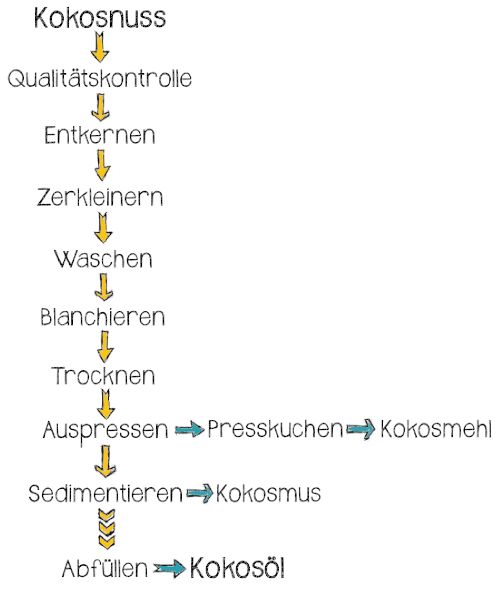
The path to the best coconut oil naturally begins with the quality control of the nuts. Only nuts of analytically and sensory flawless quality from controlled organic cultivation are used for further processing into oil.
The kerneling of the hard nuts is done by hand by trained and experienced workers. As soon as the coconut is opened, the coconut water is first collected from the inside of the nut. Once the nut has been opened, further processing must be carried out quickly. In the next step, the flesh is carefully removed from the shell by hand.
In the next stage of the process, the fresh coconut flesh is then shredded into grated coconut using stainless steel cutters. We also offer the white, aromatic grated coconut in unprocessed form. Before the virgin coconut oil can be pressed, the washed, grated coconut meat must be "blanched". The process only takes a few minutes, and the temperature of the drying hot air must be at least 80 °C and no lower. Blanching is crucial for the shelf life of the coconut oil. Coconut meat contains natural enzymes, so-called lipases, which can break down fats. If these enzymes are not inactivated by heat, the coconut oil, which is rich in lauric acid, would soon acquire a soapy taste. The water content of the coconut meat is reduced to less than three percent in the drying plant. As soon as the firm coconut meat has been blanched and dried well, virgin coconut oil is gently extracted from the so-called "copra" directly afterwards, including the thin, brown skin.
No waste is produced during the processing of the coconut, as every part of the valuable foodstuff is used: The press cake left over from the pressing process is ground in our oil mill into a fine coconut flour which is suitable for baking. After the coconut oil has been bottled, the precious coconut pastewhich remains as sediment in the barrel, is also bottled and can be used as a delicious spread.
Monkey Free Statement - Coconut harvesting without monkeys
We guarantee that no monkeys are used to harvest the coconuts for our Naturland Fair organic coconut oil. An animal-free coconut harvest is a prerequisite for our choice of supplier. The organic coconuts are harvested by men who are fully trained for this work. The coconuts are harvested using long poles fitted with a sickle. In some cases, the palm trees are climbed by the trained workers and the fruit is cut off with a knife. We also guarantee that animal testing is never used in the development and production process of our natural cosmetics.
The origin and significance of the coconut palm

Miles of white beaches, blue skies, the sound of the surf - the tropics attract holidaymakers from all over the world to relax and recharge their batteries. It's a great place to live, the nature is stunning, the people are hospitable and the food is delicious. For thousands of years, the inhabitants of South India, the South Sea islands and other tropical and subtropical regions have used the diversity of the coconut palm and its nuts as a matter of course. The palm provides building material and fuel, the high-quality oil of the coconut cares for skin and hair, and a meal without an ingredient from the coconut is unthinkable.
The coconut palm is the only species of its genus. It belongs to the palm family and originates from the South Sea islands and the Indomalayan region. The palm's distribution along the coasts of the entire tropical belt between the Tropic of Cancer and the Tropic of Capricorn around the equator is due to its buoyant fruit, the coconut. The coconut palm proves to be a versatile resource, as almost all parts of the plant are used in various ways.
It is also known affectionately as the Tree of Life, as it is the most important crop in the tropics and is of enormous economic importance as well as being a fundamental source of nutrients.
Ölmühle Solling sources its virgin organic coconut oil from the Naturland Fair certified Serendipol project in Sri Lanka, as well as a virgin coconut oil in EU organic quality from the Philippines. Only organic coconuts from smallholder farms are processed, from which coconut oil, coconut seasoning oils, coconut flour and coconut spreads are produced.
Coconut oil - solid or liquid?
Many vacationers discover clear, liquid coconut oil on their trip to tropical regions such as Thailand, the Philippines or Sri Lanka. Back home, the coconut oil is suddenly no longer liquid, but solid.
The condition and designation of coconut oil or coconut fat have something to do with the storage temperature. The oil is obtained from the dried flesh of the coconut and is liquid at temperatures above 24 °C. At lower temperatures below 24 °C, the oil solidifies. At lower temperatures below 24 °C, coconut oil solidifies. For this reason, the term coconut fat is quite correct. However, as the product is almost invariably referred to as coconut oil in the tropical countries of origin and the term is used worldwide, we at Ölmühle Solling also use this term.
It is often assumed that coconut fat is always solid and coconut oil is always liquid and that they are two different products. However, depending on the outside temperature, only the aggregate state differs. Virgin, untreated coconut oil contains a high proportion of medium-chain fatty acids, also known as MCTs (middle chain triglycerides), which include caproic, caprylic and capric acid as well as lauric acid. The former have a lower melting point than 24 °C and change their physical state quickly as the temperature increases or decreases. At room temperature they are still liquid.
A natural, wholesome coconut oil is liquid from a temperature of around 24 °C and has a transparent, water-like appearance. At temperatures below 24 °C, the oil solidifies. It remains spreadable and takes on a creamy white color. At very low temperatures, e.g. in the refrigerator, the oil becomes extremely solid and loses its spreadability.
Our partner project in Sri Lanka

Werner Baensch, founder and product developer of Ölmühle Solling, worked as a qualified food technologist with the Coconut Research Institute in Lunuwila in Sri Lanka over a period of several years. There he developed a simple process technology for producing a particularly high quality of coconut oil. This technology was presented to the public for the first time at the international Coconut Conference in Colombo in 2003. It then spread to all tropical Southeast Asian countries. Since 2006, Ölmühle Solling has been working closely with Serendipol, one of the newly established coconut oil projects in Sri Lanka, on technical design and quality control.
The project was an investment by the well-known US natural soap manufacturer Dr. Bronner's, which needed a source of fair trade coconut oil from organic cultivation. This experience made Ölmühle Solling a pioneer in the quality of coconut oils from recognized organic cultivation.
Since its foundation in 2006, Serendipol has been working with smallholder farmers in the Kuliapitiya area, advising and supporting them in the organic management of their coconut farms. Over the years, more than 1,300 smallholders and farmers have joined this project and cultivate a total area of over 8,000 hectares.
In addition to coconut palms, the many organic plantations also grow other crops for daily subsistence. This contributes greatly to the fact that organic farming can be sustainable in many areas of life under these tropical climatic conditions. For the local people, this means secure jobs in coconut processing and thus improved living conditions and opportunities for future generations. Because peace has finally returned to Sri Lanka after the long civil war between the Tamils and the Sinhalese and the economic livelihoods of the rural population are continuously improving, sustainable organic farming in accordance with the stricter Naturland standards is becoming increasingly important. The prerequisite for Naturland certification is a type of holistic agriculture that relies on environmentally friendly animal husbandry and crop cultivation, while conserving existing agricultural resources but using them in moderation. There are subtle differences to the less demanding EU organic regulation.
With over 1,300 organic farmers, Serendipol is an important development factor in this rural region and provides important impetus when it comes to promoting employment and education, medical care and community development. This is precisely where our fair partnership comes in. We voluntarily pay an additional fair trade premium for the coconut oils produced at the Serendipol oil mill and, together with Serendipol's other customers, support a growing number of community projects such as hospitals and small health centers in rural areas, school improvements, infrastructure measures and landscape conservation involving farmers and communities.
Research projects and cooperations
Ölmühle Solling not only obtains the valuable coconut oil from Serendipol, but there is also a lively exchange on the technology of producing coconut oil and other products from the coconut. In cooperation with universities(HS OWL Lemgo and HS Fulda) and research institutes in Germany, an exchange of knowledge has been initiated that contributes significantly to our ability to offer a wide range of top-quality coconut products.
Ölmühle Solling is also currently involved in a research project at the Ostwestfalen-Lippe/Lemgo University of Applied Sciences in cooperation with the Federal Research Institute of Nutrition and Food/Working Group for Lipid Research in Detmold, which is intended to provide information about the content of secondary plant substances in coconut oils and confirm evidence that the outer brown skin surrounding the nut meat contains valuable secondary plant substances, vitamins and polyphenolic antioxidants.
The Naturland Fair seal

The Naturland Fair label identifies products that comply with our guidelines for organic farming and fair trade. In addition to classic fair trade products such as coffee and chocolate, these include products such as milk and bread. Fair producer prices and reliable trade relations give producers in countries of the South and in our country the security they need to invest in the future.
Naturland Fair is the test winner
The fact that only the combination of organic and fair is truly sustainable was recently confirmed once again by Stiftung Warentest. In the May 2016 issue, the testers evaluated six different sustainability seals and came to the clear conclusion: "The Naturland Fair seal sets the highest standard".
Recipe
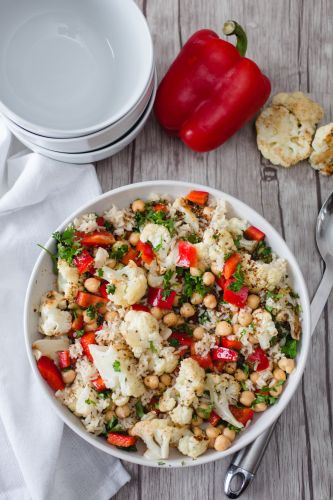
Cauliflower salad
Simple recipe for cauliflower salad with pepper and chickpeas. Refined with roasted hazelnuts and a dressing from olive oil and lemon juice. zum Rezept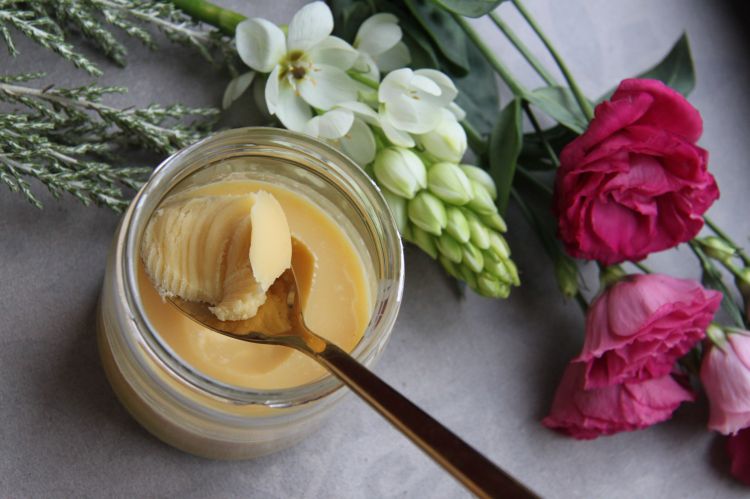
Vegan butter
Recipe for vegan butter with coconut and canola oil. Turmeric creates a natural yellow colour. Perfect as a spread or for baking. zum Rezept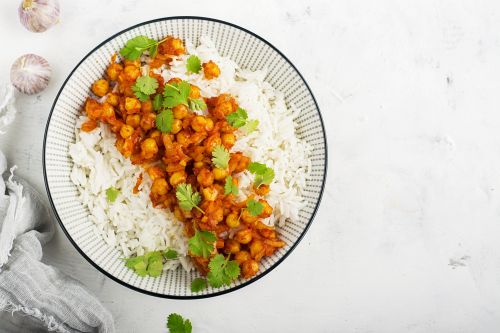
Chickpea curry with turmeric
Quick and easy recipe for curry with chickpeas and turmeric powder. Served with jasmine rice and seasoned with Garam Masala spice oil and coconut flour. zum Rezeptweitere Rezepte
Ratings
Specification and ingredients
Coconut oil
Average energy and nutrient content for 100 g
Please enjoy our products as part of a diverse and balanced nutrition.
As a product of nature the composition of the oil can vary, the given specifications are therefore average values.
Ingredients
Coconut oil, certified organicDurability
15 - 18 monthsLagerung
Store in a cool and dark place. Spreadable at room temperature.Fatty acids diagram

Botanical name: cocos nucifera L.
Organic coconut oil should be stored in a dark, dry place protected from light at temperatures of 10-20°C. Under optimal conditions it will keep for up to 18 months.
Fatty acid composition of virgin coconut oil:
6:0 caproic acid 0.8 %
8:0 caprylic acid 10.1 % Capric, caprylic and capric acids are also known as middle chain triglycerides(MCTs).
10:0 Capric acid 5.9 % Lauric acid is also sometimes included. In total, this results in a content of approx. 68% MCTs.
12:0 lauric acid 49.1 %
14:0 myristic acid 19.5 %
16:0 palmitic acid 7.5 %
18:0 Stearic acid 2.6 %
18:1 Oleic acid 4.7 %
18:2 Linoleic acid 0.7 %
The values given are average values and are subject to natural biological fluctuations, as the fat composition depends on the climate, soil conditions and degree of ripeness.




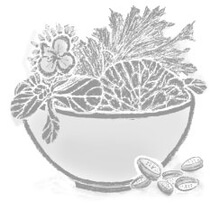
 Coconut flour
Coconut flour Coconut butter
Coconut butter Coconut rasps
Coconut rasps Coconut flower sugar
Coconut flower sugar